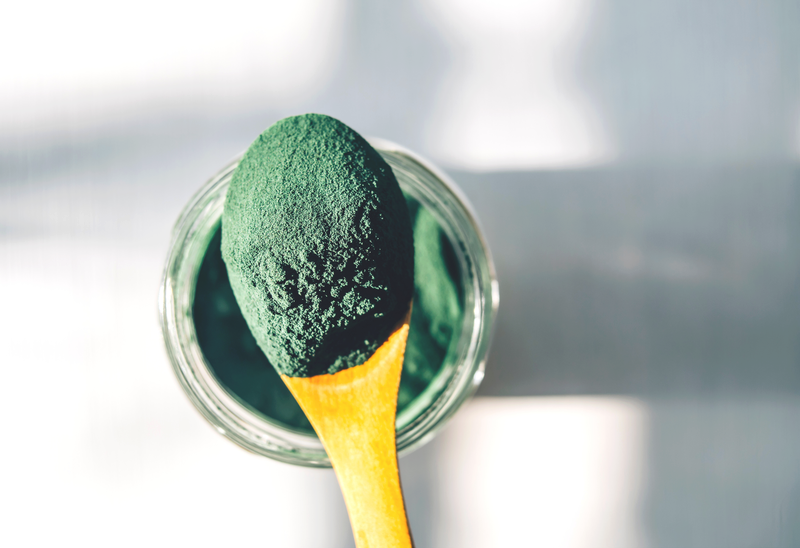|
As you may have noticed, we carry Vital Proteins Spirulina capsules at the office. A common question we get is, "what is spirulina and why would I need it?"
what is spirulina? Spirulina, a blue-green colored freshwater plant (and cousin to chlorella), is one of the most researched superfoods today and known for its intense flavor and nutrient-dense profile. There are two species of the spirulina plant, including Arthrospira platensis and Arthrospira maxima, both of which are cultivated worldwide and used as a dietary supplement and whole food. To date, there are over 1,800 peer-reviewed scientific articles evaluating spirulina's health benefits. (!!) That said, contamination by toxins and heavy metals is a serious concern, so it's important to choose a spirulina supplement with reliable third-party testing and quality assurance. what is spirulina good for? Of the many research studies done on spirulina and its benefits, conclusions include (among others):
a note on serotonin Serotonin, probably the most famous neurotransmitter of the bunch, is an inhibitory compound that aids in relaxation, anxiety, depression, memory, socialization, sexual function, sleep, blood pressure stability, pain, appetite, and digestive regularity. Serotonin receptors are found in the heart, intestines, blood vessels, uterus, and ovaries. Beyond its direct effects, serotonin has the ability to modulate the release of other neurotransmitters and hormones that regulate both the stress response and sexual function. Consuming a diet rich in tryptophan aids in the production and utilization of serotonin. Tryptophan is found in poultry, beef, fish, dairy, seeds, chocolate, dates, and spirulina (among other food sources). Additionally, low levels of tryptophan have been associated with anxiety and depression. Did you know? Inflammation drives the depletion of tryptophan. So, removing pro-inflammatory foods as much as possible is a great place to start when supporting levels. top 5 benefits of daily spirulina supplementation: 1. Antioxidant + anti-inflammatory properties A 2013 review suggests that spirulina may play a role in preventing heart disease due to its cholesterol-lowering, anti-inflammatory, and antioxidative effects. 2. Positive impact on blood lipid levels A 2016 systematic review and meta-analysis suggests that taking spirulina supplements may have a positive impact on blood lipid levels. In the study, spirulina was found to significantly reduce total cholesterol and lower LDL cholesterol while increasing HDL cholesterol. 3. Heavy metal detoxification Research has shown that spirulina supplementation is effective in decreasing arsenic (and other heavy metal) levels in the body. A 2016 review found that spirulina had antitoxic properties that could counteract pollutants in the body, including arsenic, fluoride, iron, lead, and mercury. 4. Gut microbiota support Candida overgrowth has become one of the revealing signs of most autoimmune diseases today and intertwines with leaky gut syndrome (increased intestinal permeability), improper digestion, and imbalances to the gut microbiota. Spirulina supplementation has been shown to promote the growth of healthy gut bacteria (which inhibits candida from thriving). More-so, the immune-strengthening properties of spirulina can help the body eliminate candida cells. 5. Memory support + for brain disorders A 2012 study concluded that Spirulina (Arthrospira platensis) may “prevent the loss of memory possibly by lessening Aβ protein accumulation, reducing oxidative damage and mainly augmenting the catalase activity.” nutrition Gram per gram, spirulina is one of the most nutrient-dense foods on Earth. Just one, 3-gram serving contains:
how can spirulina be taken? Since spirulina can be found in powder form, you can supplement your diet by adding it to smoothies, juices, salads, or soups. Another fun way to use it is to mix it into energy balls or smoothie bowls. Note: If using capsules, simply break open the capsule and tap it until the powder comes out. why we love Vital Proteins Spirulina capsules We love that Vital Proteins takes measures to ensure the safety and highest quality of all of their supplements. They use third-party testing and rigorously examine every lot of finished goods, as well as raw materials, to ensure full compliance with Prop 65 standards. Their capsules are easy to take and can also be used to add to recipes or to sprinkle on top of soups/salads (simply open the capsule!). final thoughts While you may have only seen spirulina as an ingredient in a green smoothie you had at a hip juice bar, the nourishing benefits of this superfood are so profound that strong consideration for adding it to your daily supplement regimen is warranted! cautions Those with phenylketonuria (PKU) should first consult with their healthcare practitioner before supplementing with spirulina. Anyone taking any type of anti-coagulation medication should consult with their healthcare practitioner before beginning (or stopping) taking spirulina. Those with or who are susceptive to autoimmune conditions, be considerate as spirulina may cause autoimmune reactions.
0 Comments
Leave a Reply. |
blogRead our posts and join the conversation by commenting or sharing with community. categories
All
archives
October 2023
|
Elkhorn WIhoursMONDAY: 2-6
TUESDAY: 9-12 + 3-7 WEDNESDAY: 2-6 THURSDAY: 3-7 FRIDAY: 9-12 SATURDAY: 9-12 |
Johnson Creek WIhoursMONDAY: 2-6
TUESDAY: 2-6 WEDNESDAY: 2-6 THURSDAY: CLOSED FRIDAY: 2-6 SATURDAY: CLOSED |
subscribe to our emails |



 RSS Feed
RSS Feed